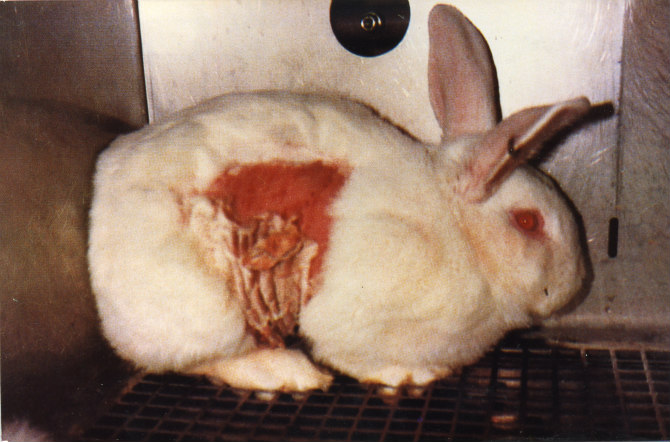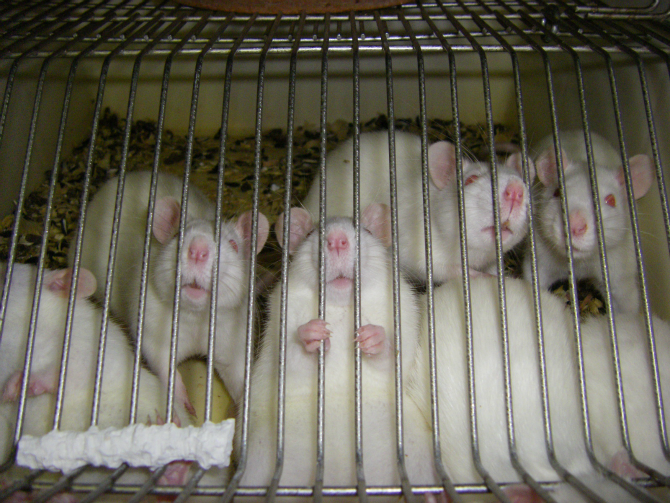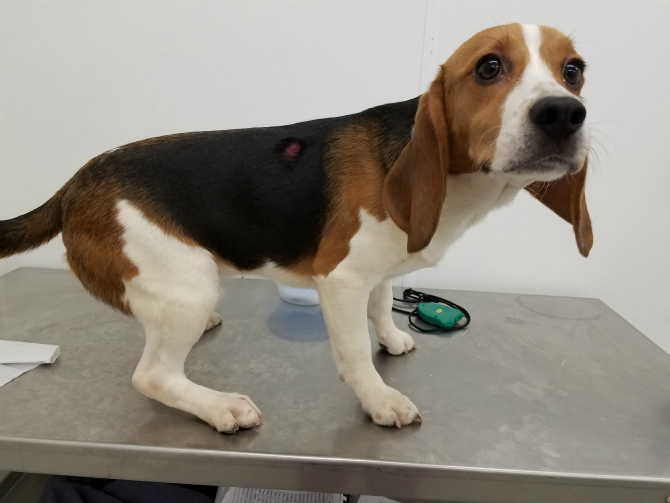Expert Statements on Tania Roth’s ‘Child Abuse’ Experiments on Rats, University of Delaware, University of Tennessee College of Medicine Chattanooga, European Parliament, Delaware, California , PETA International Science Consortium, Animal Testing Weekly Updates!

PETA Sues Texas A&M for Facebook Censorship. In a first-of-its-kind lawsuit, PETA is suing Texas A&M University after the school shut down free speech by filtering social media posts about its cruel dog experiments. Feel free to chime in to help!
The University of Tennessee College of Medicine Chattanooga has ended the use of pigs for training future emergency medicine doctors!
We couldn’t have done this without your support. Countless phone calls and e-mails to the school made all the difference and helped us put a stop to animal suffering while modernizing medical training. And we also could not have done this without donations from our supporters to help fund this campaign all the way to a successful outcome.
Let’s end another emergency medicine lab now—at Vanderbilt University where residents train on live pigs and goats. Write the school today.
In 2016, the Chattanooga campus was the very last medical school in the country using animals to train students. And after 31 years of tireless, dedicated campaign work by the Physicians Committee, we were able to declare all medical schools in the United States and Canada free of live animal labs.
However, as you know, after medical school, many physicians go on to residency programs to become specialists. The emergency medicine residency in Chattanooga was still using animals and asked trainees to make incisions in live pigs, insert tubes and needles into the animals’ chests and abdomens, and cut into their veins.
We’ve been working hard to modernize emergency medicine residency programs, and Chattanooga is the latest program that has replaced animal use and stepped into the 21st century. Today, 94 percent of 225 surveyed emergency medicine programs in the United States and Canada use only nonanimal methods, and that number grows each year.

The University of Delaware's Tania Roth claims that she studies child abuse. But her experiments are all about making vulnerable and sensitive rats suffer. She's forced alcohol down the throats of newborn ones. She's stuffed pregnant mothers into tiny restraint tubes and blasted them with strobe lights. She's purposely terrified rats by repeatedly shocking their feet, and she's taken newborns away from their mothers and given them to other rats who are unable to care for them.
Roth has been tormenting animals at taxpayer expense for nearly two decades. She's received more than $1.8 million in public funding. What is there to show for it? Published papers with glaring omissions about the treatment of these doomed animals, no apparent benefits for human children who are abused … and a mountain of animal bodies.
Expert Statements on Tania Roth’s ‘Child Abuse’ Experiments on Rats
Patrice Green, M.D.
I am a physician with more than 20 years of clinical experience and direct patient care. I have been on the faculty of the University of Maryland School of Medicine and the Philadelphia College of Osteopathic Medicine. My clinical experience has involved both inner city and rural populations and, while I have cared primarily for adults, I have cared for adult survivors of child abuse, relying on clinical research when dealing with their multiple complex and pervasive psychosocial issues.
I am concerned that psychological experiments conducted on animals have failed to contribute to the health and well-being of humans. In particular, Tania Roth’s child abuse studies on rats have not yielded helpful insights into the foundations of human mental illness and have not improved our treatment of these illnesses. Roth’s experiments are not designed in a way that is remotely applicable to the human clinical setting. Moreover, her studies are poorly conducted and cause immeasurable harm to sensitive, intelligent rats and their offspring. According to an analysis from Tufts University, therapies developed for central nervous system disorders have the highest failure rate1 in advanced clinical trials, and the use of animals as models is recognized as a major factor in this failure. We must reevaluate these experiments and redirect funding to clinically relevant, non-animal studies.
1Tufts Center for the Study of Drug Development. 2012. Pace of CNS drug development and FDA approvals lags other drug classes. Impact Report, Volume 14, Number 2. Tufts University.
James H. Yahr, M.D., F.A.C.S.
Tania Roth’s child abuse experiments on juvenile rats and their mothers are reminiscent of a gruesome horror novel. The experiments are unproductive, having no apparent applicability to human children or their well-being. To offer just one example, Roth attempts to mimic fetal alcohol absorption by force-feeding alcohol to newborn rats via intragastric intubation (through a tube that has been inserted down their throats). The experiments are so traumatizing that many of the neonates die in the process—and so poorly designed that data from the experiments are worthless. In one experiment, the pups who were intubated but not exposed to alcohol also exhibited changes to the biological marker in which Roth was interested, likely just from the stress of the procedure. Because of this confound, nothing meaningful could be concluded. Importantly, Roth’s methods in no way replicate the way a child would be exposed to alcohol in utero. Tania Roth’s disturbing experiments on rats should be ended immediately.
Carol Tavani, M.D., M.S., D.L.F.A.P.A.
As a physician and a scientist, I am appalled by Tania Roth’s child abuse experiments on rats. It is more than a stretch to say that these results could ever be extrapolated to humans. The oversight committee’s approval of this “research” is evidence to the fact that this system is nothing more than the fox guarding the henhouse. It is high time that more rigorous, objective oversight is implemented and that the Animal Welfare Act be amended to include birds, rodents, and fish, the most common species used in laboratories who currently have no protection under federal law. As a taxpayer, I certainly don’t want my taxes supporting such inhumane, obviously dubious experiments like Tania Roth’s. What a colossal waste of federal funds. I’m glad PETA is shedding light on this awful situation, and I appeal to the University of Delaware to stop these experiments immediately.
Jeanne C. Folks, D.Min., LPC
I’m a Licensed Professional Counselor with over 35 years of experience in clinical practice, a Clinical Member of the International Institute of Traumatic Stress Studies, a Certified Fellow of the American Psychotherapy Association, EMDRIA/EMDR-certified, and an EMDRIA-approved consultant.
As clinical director of CT Psychotherapeutic Resources, a private practice dedicated to the treatment of traumatic stress, I believe that we will not have a world that is peaceful and free from violence as long as we are systematically inflicting suffering and pain on animals. The consequences of trauma and abuse are complex and far-reaching, and treating these conditions requires a multifaceted approach that addresses this problem on both an individual and societal level. There is absolutely no justification to deliberately inflict the trauma of abuse and neglect on sentient beings, no matter the species. Dr. Roth’s cruel and unnecessary experiments on rats, in which she separates babies from mothers in order to place them with fosters who are then forced into abusing them, will only take us further from the goal of addressing the widespread abuse and violence present in our society. For almost 20 years, Roth has traumatized and killed rats in painful psychological experiments that have yet to directly contribute to any tangible treatments for humans. Every day, I see the scars that trauma and abuse leave on my human patients, and I fully support the quest for improved and effective treatments that would alleviate suffering in people. But these future treatments will only come from human-relevant studies—we will not find these answers in the pain and suffering of rats. It is time for these experiments to end.
Timid rats shake in fear, their hearts thump,
and their pulse rate goes through the roof when they see a white-coated worker
opening the cage door – because they know exactly what's coming.
They're lifted up and crammed into a tube only a
millimetre bigger than their bodies, rendered immobile, and forced to inhale
whatever substances the experimenters choose for hours at a time. They
will be subjected to this panic and horrifying torment over and over again until
they are killed and their bodies cut up for examination.
No animal – small, large, familiar, or unfamiliar – should suffer
this way in crude, cruel, and archaic tests. Please, help us do more to prevent such misery?These little white rats were killed in one of tens of thousands of inhalation tests. They're among the approximately 11 million animals who will be abused in nightmarish experiments in Europe alone during the next year. Other animals will be poisoned, denied food or water, deprived of sleep, subjected to psychological distress, deliberately inflicted with brain damage, infected with diseases, paralysed, surgically mutilated, irradiated, burned, force-fed, or electrocuted – and, of course, ultimately killed.
It should not be the case, but many painful and
frightening tests on rats, rabbits, and other animals are done to meet chemical
regulations that mandate animal tests under various laws such as the
Registration, Evaluation, Authorisation and Restriction of Chemicals (REACH)
regulation. Under REACH requirements, chemical companies must provide the
results of animal tests for almost every chemical in use – and if they don't
have these results, they are frequently required to conduct new tests. But wait
…
We are determined to end such requirements.
Since the moment the REACH programme began, PETA and our international
affiliates have been working with chemical companies, scientists, EU officials,
and politicians to help animals by showing that there are proven non-animal
research methods available. We also present information about cutting-edge,
animal-free research methods at well-attended scientific conferences and
seminars, reaching thousands of researchers.
European legislators have long said that the
ultimate goal is to end all experiments on animals. PETA isn't letting
them lose sight of that objective.
That's why we and our affiliates formed the PETA
International Science Consortium Ltd., a group of top science and policy experts
from around the world which has "stakeholder status" with the European Chemicals
Agency (ECHA) – the institution in charge of administrating REACH. With that
status, the Consortium is granted access to international regulators and
meetings relating to REACH, where it also encourages the replacement of tests on
animals.
The Consortium is also directly funding the
development of non-animal methods to replace cruel and deadly tests on animals –
something that has the potential to save tens of thousands of animal lives, and
likely far more, every year. PETA and our affiliates have already persuaded ECHA
to issue a warning about the need to prevent duplicative animal tests and
provided facilities around the world with sophisticated computer simulators and
other research equipment to help reduce or outright stop tests on animals.
This work comes with a high price tag,
but it's worth it in the quest to stop suffering and spare animals'
lives. Please help animals by making a generous donation to PETA to support
our critical work?
As you read this, rabbits, dogs, and other animals are imprisoned in barren cages at secretive laboratories – hidden away from public scrutiny as they're poisoned, gassed, electrocuted, cut open, and killed. Despite the existence of animal-free testing methods that are superior in every way, experimenters around the world are still subjecting animals to misery and abuse – and we must stop them.
Despite the existence of animal-free testing methods that are superior in every way, experimenters around the world are still subjecting animals to misery and abuse – and we must stop them.
Your help will give power to PETA's crucial work to replace tests on animals with modern, non-animal methods and to stop the suffering of many other beings. Despite the existence of animal-free testing methods that are superior in every way, experimenters around the world are still subjecting animals to misery and abuse – and we must stop them.
Despite the existence of animal-free testing methods that are superior in every way, experimenters around the world are still subjecting animals to misery and abuse – and we must stop them.We'll work to expose terrible cruelty in laboratories – like those where rats are forced to inhale chemicals or substances are applied to rabbits' eyes – and inform the public about the horrors of animal testing.

We'll keep pressure on companies and policymakers to stop cruel, archaic experiments on animals to test the toxicity of pesticides and other substances. We'll promote humane and effective testing methods that can spare millions of animals' lives – from mice to monkeys.
We'll promote humane and effective testing methods that can spare millions of animals' lives – from mice to monkeys.
 We'll promote humane and effective testing methods that can spare millions of animals' lives – from mice to monkeys.
We'll promote humane and effective testing methods that can spare millions of animals' lives – from mice to monkeys.
Scientists are recognising that cell and tissue cultures, computer models, and other animal-free methods are the future of science. They've developed a model "microbrain" from human brain cells in order to study tumours, created artificial bone marrow, and discovered a way to produce vaccines from human cell cultures, rather than treating animals like living antibody factories.
As a member of the PETA International Science Consortium Ltd., PETA is helping to promote the development of innovative methods like these and to ensure their use around the world. The Consortium's scientists attend conferences, lead seminars, and collaborate with policymakers to ensure that we can spare more animals than ever before – but this crucial work comes at a high cost.














